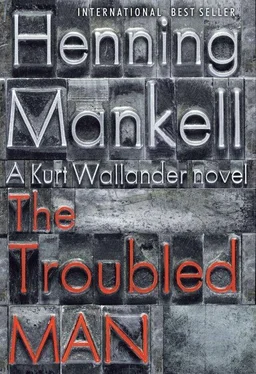What worried him most was his forgetfulness. He would write a list when he drove to Simrishamn or Ystad to do some shopping, but when he entered the shops he would realize he had forgotten it. Had he in fact ever written one? He couldn’t remember. One day, when he was more worried than usual about his memory, he made an appointment with a doctor in Malmö who advertised herself as a specialist in “the problems of old age.” The doctor, whose name was Margareta Bengtsson, received him in an old house in the center of Malmö. In Wallander’s prejudiced view she was too young to be capable of understanding the miseries of old age. He was tempted to turn around and leave, but he controlled himself, sat down in a leather armchair and began talking about his bad memory that was getting worse all the time.
“Do I have Alzheimer’s?” Wallander asked as the interview drew to a close.
Margareta Bengtsson smiled, not condescendingly but in a straightforward and friendly way.
“No,” she said. “I don’t think so. But obviously, nobody knows what’s lurking around the next corner.”
Around the next corner, Wallander thought as he walked back to his car through the bitterly cold wind. When he got there he found a parking ticket tucked under a windshield wiper. He flung it into the car without even looking to see how much he had been fined and drove home.
A car he didn’t recognize was waiting outside his front door. When Wallander got out of his own car, he saw Martinsson standing by the dog kennel, stroking Jussi through the bars.
“I was just going to leave,” said Martinsson. “I left a note on the door.”
“Have they sent you to deliver a message?”
“Not at all — I came entirely of my own accord to see how you were.”
They went into the house. Martinsson took a look at Wallander’s library, which had become extensive over the years. Then they sat at the kitchen table, drinking coffee. Wallander said nothing about his trip to Malmö and the appointment with the doctor. Martinsson nodded at his plastered hand.
“The cast will come off next week,” said Wallander. “What does the gossip have to say?”
“About your hand?”
“About me. The gun at the restaurant.”
“Lennart Mattson is an unusually taciturn man. I know nothing about what’s going on. But you can count on our support.”
“That’s not true. You no doubt support me. But the leak must have come from somewhere. There are a lot of people at the police station who don’t like me.”
Martinsson shrugged.
“That’s life. There’s nothing you can do about it. Who likes me?”
They talked about everything under the sun. It struck Wallander that Martinsson was now the only one left of the colleagues who were at the police station when he first moved to Ystad.
Martinsson seemed depressed as he sat there at the table. Wallander wondered if he was ill.
“No, I’m not ill,” said Martinsson. “But I’m resigned to the fact that it’s all over now. My career as a police officer, that is.”
“Did you also leave your gun in a restaurant?”
“I just can’t take it anymore.”
To Wallander’s astonishment, Martinsson started crying. He sat there like a helpless child, his hands wrapped around his coffee cup as the tears ran down his cheeks. Wallander had no idea what to do. He had occasionally noticed that Martinsson was depressed over the years, but he had never broken down like this before. He decided simply to wait it out. When the phone rang he unplugged it.
Martinsson pulled himself together and dried his face.
“What a thing to do!” he said. “I apologize.”
“Apologize for what? In my opinion anyone who can cry in front of another man displays great courage. Courage I don’t have, I’m afraid.”
Martinsson explained that he felt he had lost his way. He found himself questioning more and more the value of his work as a police officer. He wasn’t dissatisfied with the work he did, but he worried about the role of the police in the Sweden of today. The gap between what the general public expected and what the police could actually do seemed to be growing wider all the time. Now he had reached a point where every night was a virtually sleepless wait for a day he knew would bring more torture.
“I’m packing it in this summer,” he said. “There’s a firm in Malmö I’ve been in contact with. They provide security consultants for small businesses and private properties. They have a job for me. At a salary significantly higher than what I’m getting now, incidentally.”
Wallander recalled another time many years ago when Martinsson had made up his mind to resign. On that occasion Wallander had managed to persuade him to soldier on. That must have been at least fifteen years ago. He could see that this time, it was impossible to talk his colleague out of it. It wasn’t as if his own situation made his future in the police force particularly attractive.
“I think I understand what you mean,” he said. “And I think you’re doing the right thing. Change course while you’re still young enough to do it.”
“I’ll be fifty in a few years’ time,” he said. “You call that young?”
“I’m sixty,” said Wallander. “By then you’re definitely on a one-way street to old age.”
Martinsson stayed a bit longer, talking about the work he would be doing in Malmö. Wallander realized the man was trying to show him that despite everything, he still had something to look forward to, that he hadn’t lost all his enthusiasm.
Wallander walked him to his car.
“Have you heard anything from Mattson?” Martinsson asked tentatively.
“There are four possible options,” Wallander told him. “A ‘constructive reprimand,’ for instance. They can’t do that to me. That would make a laughingstock of the whole police force. A sixty-year-old officer sitting before some police commissioner like a naughty schoolboy, told to mend his ways.”
“Surely they aren’t seriously considering that? They must be out of their minds!”
“They could give me an official warning,” Wallander went on. “Or they could give me a fine. As a last resort, they could give me the boot. My guess is I’ll get a fine.”
They shook hands when they came to the car. Martinsson vanished into a cloud of snow. Wallander went back into the house, leafed through his calendar, and established that three months had now passed since that unfortunate evening when he forgot his service pistol.
He remained on sick leave even after the cast had been removed. On April 10 an orthopedic specialist at Ystad Hospital discovered that a bone in Wallander’s hand had not healed as it should have. For a brief, horrific moment Wallander thought they were going to break his wrist again, but the doctor assured him that there were other measures they could take. But it was important that Wallander not use his hand, so he couldn’t go back to work.
After leaving the hospital, Wallander stayed in town. There was a play by a modern American dramatist on at the Ystad theater, and Wallander had been given a ticket by Linda, who had a bad cold and couldn’t go herself. As a teenager she had thought briefly about becoming an actress, but that ambition passed quickly. Now she was relieved she had realized early on that she didn’t have enough talent to go on the stage.
After only ten minutes, Wallander started checking his watch. The play was boring him. Moderately talented actors were wandering around in a room and reciting their lines from various places — a stool, a table, a window seat. The play was about a family in the process of breaking up as a result of internal pressures, unresolved conflicts, lies, thwarted dreams; it completely failed to engage his interest. When the first intermission came at last, Wallander grabbed his jacket and left the theater. He had been looking forward to the production, and he felt frustrated. Was it his fault, or was the play really as boring as he found it?
Читать дальше












